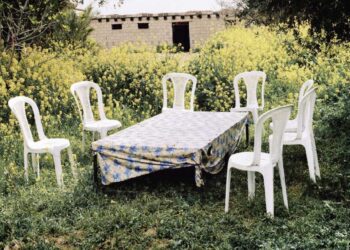As I was watching and listening to the characters in The Burdened (Al Murhaqoon), the Yemeni film directed by Amr Gamal, the first feeling I had was a déjà vu. I still remember the day when a Yemeni friend of mine asked me to help her with an abortion. I was scared. For her, for the baby, for me as this is a crime in Yemen. She was in her fourth pregnancy, during the first three years of the war.
She wanted the child, but she was sure she and her husband couldn’t afford it. They had barely anything to eat every day. She was weak and was wondering about her health and life after delivering the baby. I started searching carefully for help around, despite disagreeing with her will, and I discovered an impressive undergrowth of female rebellion and resilience among midwives, even in the village where I was living. Ultimately she decided to keep the baby. Exactly the opposite of Isra’a and Ahmed in The Burdened.
It takes a lot of courage to make a movie like The Burdened . Gamal, the director, was born in Yemen where he lives and works. In the North, in Sana’a, an area controlled by the Houthis, the beautiful Belqis cinema is in ruins. In the South, Yemeni cinema started a new season only in 2018 when Amr Gamal made and produced Ten days before the wedding, his first movie, a Yemeni comedy about life in the midst of war. At that time, the director used to rent hotel halls for weddings and transform them into cinemas to project the movie. People waited in long queues. Tickets were available online. The complicity of the security teams at the entrance was what made the screening possible in the end. Yemenis loved Ten days before the wedding, shot with an extremely low budget and with locals acting as extras.

“My inspiration comes from the Italian neorealist cinema of Roberto Rossellini,” Amr Gamal told me, when we met in Aden. “I’m a huge fan of Rome, Open city as well as Cycles’ thieves by Vittorio De Sica. Maybe it is because our Yemeni society in the South after the war looks like the Italian one in post-Fascism. But I wish to tell stories of real people, inside real cities. I don’t want to fictionalize anything. I stay stuck to reality”.
We met under the main mosque of the older neighborhood of Crater, a district in Yemen’s Aden governorate, where British colonization started. In front of us stood the shattered building of Crater Hotel, once a luxurious spot in the city. Now there are plans for reconstruction, funded by the UAE, after Houthi and Saudi-aligned bombs reduced it into a gruyere. It was impossible to have some privacy: every two minutes a random guy, girl or family showed up and asked Gamal for a selfie.
Despite its isolation, Yemen is still a country with an active youth very connected to the global world via social media. It has its influencers and celebrities. And Gamal is definitely one of them, a young man, proud of being Yemeni with a huge sense of global cinematic culture.
“Look at this building”, he told me. I saw a simple house, two floors, in colonial British style. “There, for some time, lived Artur Rimbaud, the French poet. I consider this a holy place for the history of the city. And look how it is neglected now. It’s a pity.” I was sure that his second movie could be a leap in quality. And The Burdened really was.
The Burdened has received widespread critical acclaim from both film critics and audiences. It was nominated at the 2024 Oscars and won several awards at various international film festivals after it was screened in Berlin in 2023. It was later screened at many other international film festivals, including Sydney, Shanghai, Beijing, Taipei, and Durban. The film was commercially released in theaters in Taiwan and France in 2023, and its commercial screenings began in January 2024.

Jonathan Romney of Screen International said, “What’s striking is how extremely spare and to the point Gamal’s storytelling style is: there’s zero fat on the bones of this story, giving the film a taut directness”. Jay Weissberg of The Film Verdict described the movie as “a rigorously controlled, moving evocation of a family exhausted by the difficulties of keeping it all together”.
“This is the story of a couple who decide to proceed with abortion, going through many steps to succeed, and keep getting rejected. Making abortion illegal, as it is in Yemen, will never stop people from doing it. And these characters will just risk their lives,” says Gamal explaining his inspiration for his movie. But this movie explores more than abortion rights. “This family simply couldn’t afford another child,” he clarifies. “They were already sinking. It’s not about what’s forbidden and what’s not. It’s about a personal decision to survive. In a way, this dilemma represents the whole Yemen crisis. We have a bigger population now and no future.”
The production of the movie was far from easy. The 70 days of shooting were marked by intense challenges. Gamal’s production partner, the well-known Yemeni YouTuber Mohsen Al-Khalifi, recounts the full story:
“During filming, we faced extreme heat waves, power outages that lasted up to 18 hours a day, and rapidly deteriorating currency. When we began shooting, one USD was worth 800 Yemeni rials, but by the time we finished, the exchange rate had surged to 1,500 rials. This economic turmoil sparked public outrage, forcing us to halt outdoor filming for several days. Later, in early October 2022, Aden descended into civil unrest, trapping our crew and cast in a modest hotel in Crater for three days. The hotel was the only safe place, as the streets were rife with random gunfire. On top of that, the health system in Yemen was collapsing, and several members of our crew fell ill with fevers during an epidemic.”
Despite these obstacles, they managed to complete the entire film in those 70 days, not leaving out a single scene. Remarkably, they were able to shoot all of the outdoor scenes—which make up 40% of the movie—using a large number of extras, the largest group ever assembled for a film in Yemen. “I’m not exaggerating,” says Al-Khalifi. “We had more than 500 extras over the course of the movie.” The main cast consisted of 50 actors and actresses of various ages, many of them first-time performers, who were selected through auditions announced via social media.
If you don’t find these numbers and challenges surprising, you likely don’t understand how difficult it is to make a film in Yemen.
In reality, Yemeni cinema – understood as cinema produced in Yemen and made by Yemeni directors – is quite limited. It is much easier to come across movies with an orientalist flavour that look at Yemen romantically or films using Yemen as a setting. The first type includes “A new day in Old Sana’a” by Baden Ben Hirsi, a British director of Yemeni ancestry. The film was produced in 2005 and received some attention both at the Cairo International Film Festival and at Cannes.

The second type includes the films that Pier Paolo Pasolini shot in the country in the Seventies (“A Thousand and One Nights”, “The Walls of Sana’a”). Even the fiction films and documentaries by Khadija al Salami (“I am Nojood”, “Scream”), the first Yemeni woman director and producer, were partly shot in Yemen but produced in France. The only case of in-house production, before Amr Gamal, was a 2008 work strongly recommended by the former Minister of the Interior to prevent the hemorrhage of young Yemenis into the ranks of al-Qaeda. “The losing bet” by Mutaher al-Masri, produced by Fadl al-Olfi, tells the end of two Yemeni jihadists, returned to the country after years abroad to recruit new members and carry out deadly operations in Yemen.
Al-Khalifi is well aware of the immense burden the production work placed on his shoulders. “We (Gamal, Amjad Abu Alala, and Mohammed Alomda) founded our own production company, Adenium, but securing financing was a struggle. In the end, we managed to secure funds from Station Films, a Sudanese production company,” he explains. When asked why they faced similar challenges during the making of their first film, Ten Days Before the Wedding, Amr Gamal is clear in his response: “We still believe that cinema is a universal language—a medium that can transcend borders and speak directly to the world. I received threats from militias and unidentified individuals, but I don’t care.”
Al-Khalifi adds, “One of the key themes in our film is sacrifice and survival. In the story, a family makes the difficult decision to ‘sacrifice’ a newborn in order to survive. But how many other sacrifices are being made because of the war? Poverty kills more people than bullets.”
After the huge success of Ten days before the wedding, Gamal had the chance of living abroad. “I gave this a thought,” he said, “and I received many offers but what will happen to me if I leave Yemen? I will be a fish out of the sea”. Gamal chose to stay in Yemen, despite residency opportunities in the United States and Saudi Arabia.
So again, he started a new project. These days, Gamal and his trustworthy crew are filming around Aden and Yemen. “We cannot disclose the new project and the plot. For sure, our participation in Berlin helped us a lot. Now, we are fully focused on finishing it. Making films in a country like ours requires a miracle, and we still need many of them. But we want to tell our untold stories. At any cost.”








